If you're planning to build an online store, it's important to start by choosing the right platform. One common comparison many new business owners make is Jimdo vs Shopify, as both offer tools to help you sell online, but with different approaches and strengths.
Jimdo is known for its simplicity and ease of use, especially for beginners who want to get a website up and running quickly. Shopify, in contrast, is a dedicated eCommerce platform designed to support businesses of all sizes, offering more advanced tools and flexibility for online selling.
In this article, we’ll take a close look at Jimdo vs Shopify, comparing these two platforms across different criteria, including:
- Pricing
- eCommerce features
- Ease of use
- Design and customization
- SEO and marketing tools
- Apps and integrations
- Security compliance
- Support
We hope that this blog will help you understand the pros and cons of each platform so you can make a confident decision based on your specific needs and goals. Let's get started!
Jimdo vs Shopify – Our Quick Verdict
Before we dive deeper into the full comparison, let’s start with a quick overview. If you’re short on time and just want to understand the key differences between Jimdo vs Shopify, this section will give you a clear snapshot of what each platform offers and who they’re best suited for.
Criteria | Jimdo | Shopify | The Winner |
Pricing | From $21 to $28 per month for eCommerce | From $29 to $2,300+ per month | Jimdo |
eCommerce Features | Basic selling tools suitable for small stores | Advanced selling features for managing and scaling globally | Shopify |
Ease of Use | Easy navigation, guided by AI assistant | User-friendly but with more setup steps | Jimdo |
Design and Customization | Limited templates and simple customization | Professional themes and full design control via code or editor | Shopify |
SEO and Marketing Tools | Basic SEO settings and limited marketing functionalities | Basic SEO settings + app integrations for full marketing suite | Shopify |
Apps and Integrations | Minimal third-party integrations | Extensive app store with thousands of integrations | Shopify |
Security | Basic SSL, GDPR-compliant | PCI DSS compliance, fraud analysis, robust data protection | Shopify |
Support | Email and help center | Email support and knowledge base | A Tie |
From our point of view, Jimdo will be an ideal option for you if:
- You want a simple website or small online store without technical setup.
- You’re on a tight budget and don’t need advanced selling tools.
- You prefer a faster setup with fewer decisions to make.
With that being said, consider Shopify in case:
- You want to build a full-featured eCommerce business.
- You plan to scale your store and need advanced tools and apps.
- You want better design options, strong support, and more control over payments and security.
An Overview of Jimdo vs Shopify
Now that you've seen the main differences between Jimdo vs Shopify, let's take a look at the overview of both platforms. This section will give you a clear picture of what Jimdo and Shopify offer, along with their pros and cons. Stay tuned!
Jimdo pros and cons
Jimdo is a website builder that focuses on simplicity and speed. It is designed for people who want to create a site quickly without much technical knowledge. With its AI-powered builder, Jimdo can generate a ready-to-use website in just a few minutes. This makes it a popular choice for freelancers, small business owners, and anyone seeking an affordable online presence solution.

Additionally, Jimdo also provides basic eCommerce tools, allowing you to sell products directly from your website. But please note that, while it works well for small stores, it is not as advanced as platforms built specifically for eCommerce. Still, Jimdo’s low cost and beginner-friendly approach make it appealing for those who value simplicity over complexity.
Here are the Jimdo pros and cons for your consideration.
Pros | Cons |
- Very easy to set up and beginner-friendly - AI-powered website builder for quick site creation - Affordable pricing with free plan available - Basic eCommerce features included | - Limited scalability for larger businesses - Fewer integrations compared to other platforms - Limited customization functions and template options |
If you want to have more expert insights into this platform, don't forget to check out our Jimdo review here.
Shopify pros and cons
Now let's talk about Shopify, one of the best eCommerce platforms in the market. Unlike Jimdo, it is built specifically for selling online, which means it offers a much wider range of features to support businesses at every stage of growth. From managing inventory to processing payments and running marketing campaigns, Shopify provides tools to handle nearly every aspect of an online store.

Shopify is well-known for its scalability. It works equally well for small startups and established brands. With access to thousands of apps, integrations, and professional themes, Shopify gives users flexibility and control. However, this level of functionality comes at a higher cost, and there may be a slight learning curve for beginners.
Pros | Cons |
- Robust eCommerce tools for businesses of all sizes - Large app ecosystem with thousands of integrations - Professional themes with extensive design flexibility - Strong SEO and marketing capabilities | - Monthly costs can add up with apps and add-ons - Some advanced features require extra learning - Can feel overwhelming for complete beginners - No free plan available |
For more details on this platform, feel free to check out our Shopify review here or watch our video below.
Now that we’ve looked at the pros and cons of both platforms, the next step is to compare their pricing. Understanding the cost differences between Jimdo vs Shopify will help you decide which platform gives you better value for your budget.
Pricing
The verdict:
When it comes to Jimdo vs Shopify pricing, Jimdo clearly wins on affordability. It is perfect for beginners, freelancers, or small businesses that want to start selling online at a low cost.
When comparing Jimdo vs Shopify, pricing is often one of the first factors users consider. Both platforms use subscription-based models, but the cost and what you get at each level are very different. In this section, let's break it down so you can see which option fits your budget and needs.
Jimdo offers one of the most affordable ways to get started online, especially for beginners who are looking for a simple website builder. It even includes a free plan, which is useful for testing the platform before committing to a paid subscription. But please note that the free plan comes with basic features, limited storage, and ads, so it is more suitable for personal websites or very small projects.
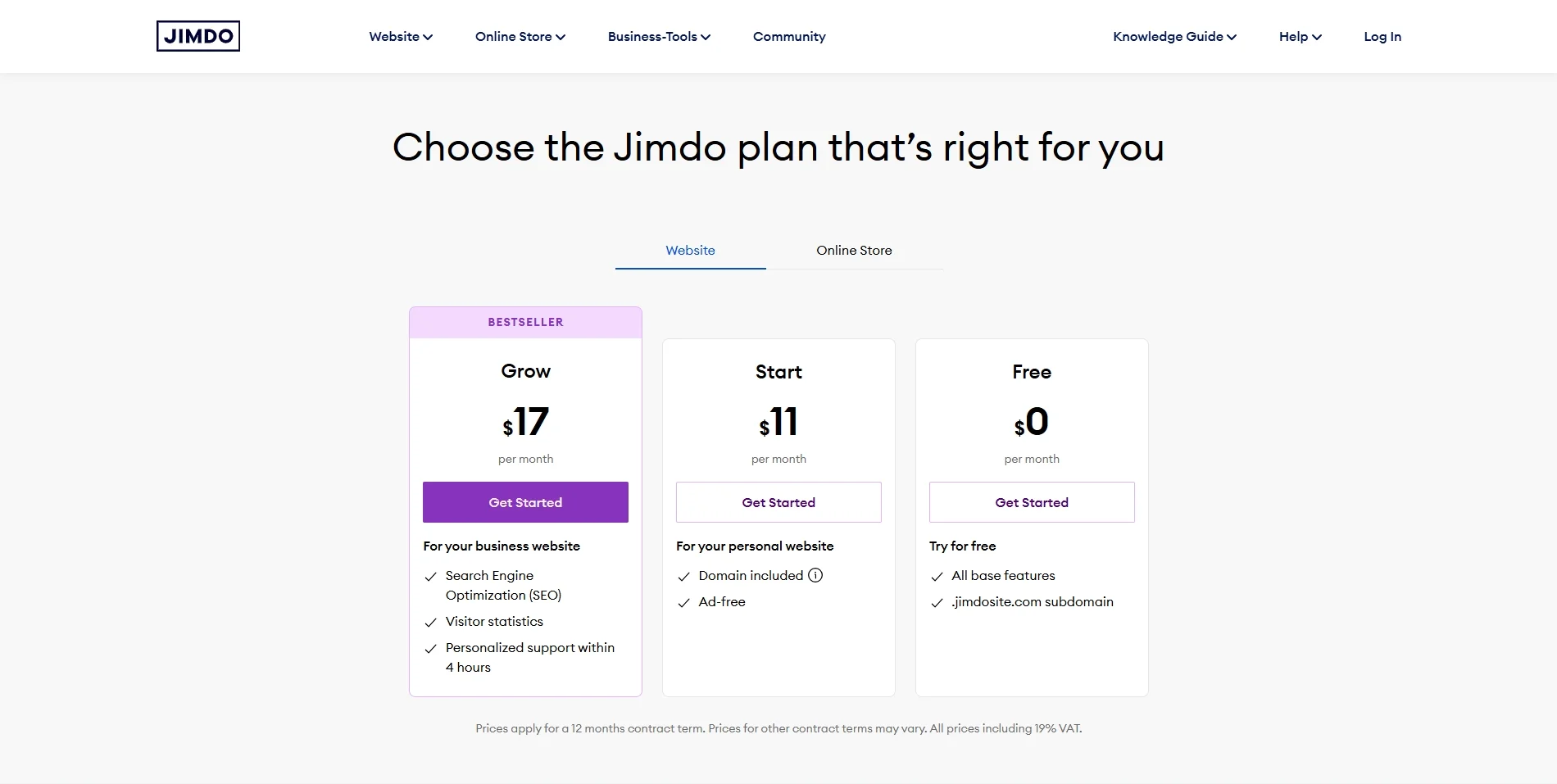
Paid plans start at a low monthly cost and provide extras such as website hosting, SSL certificates, more storage, and access to Jimdo’s AI website builder. As you move up to higher-tier plans, you gain access to more advanced features like better customer support, professional email addresses, and eCommerce functionality.
For businesses wanting to sell online, Jimdo has dedicated eCommerce plans that unlock online store features. These include the ability to list products, accept payments through gateways like PayPal and Stripe, and manage basic shipping and tax settings.
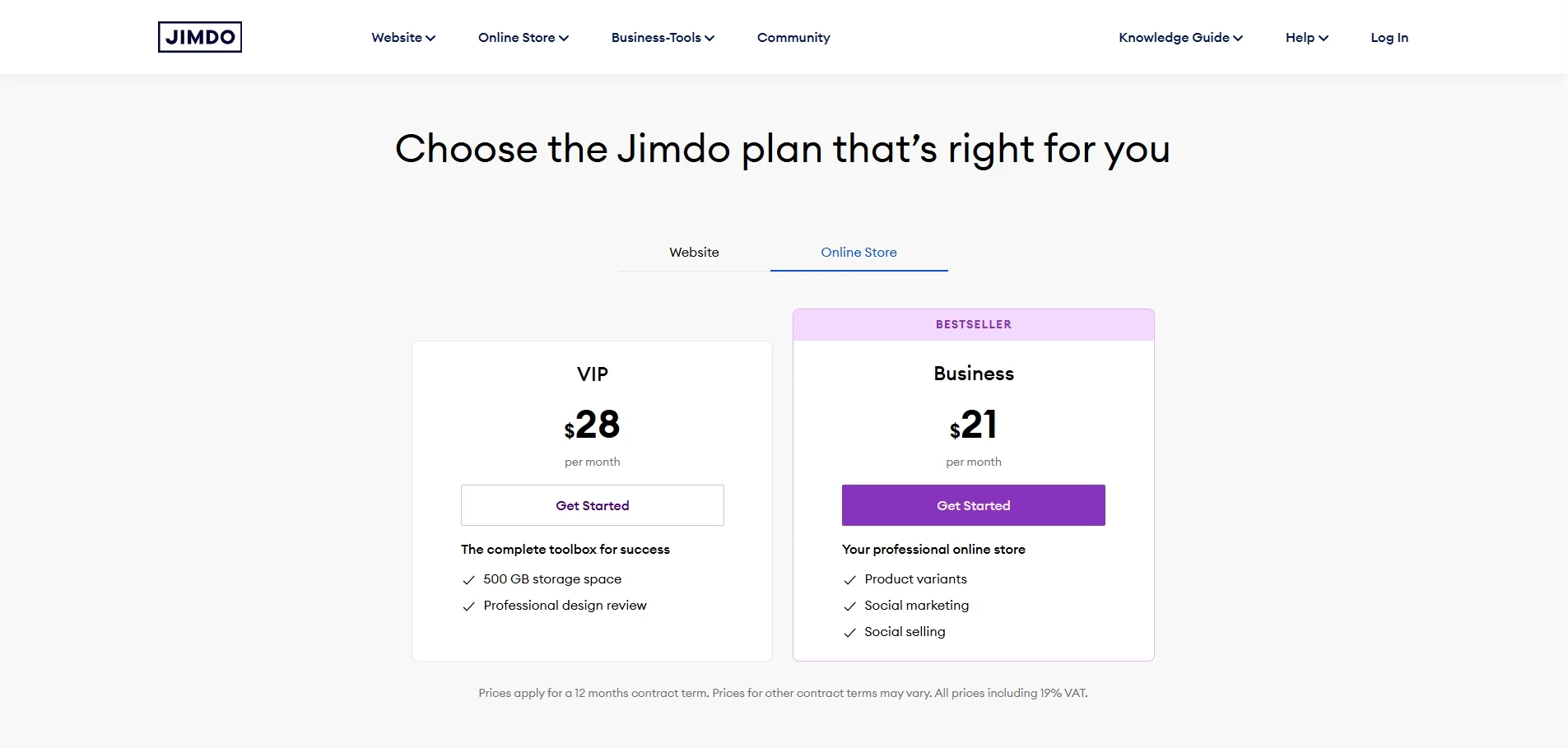
However, these tools remain fairly limited when compared to Shopify. While Jimdo’s pricing is attractive for those starting out, the limited functionality of higher-tier plans may become restrictive as your business grows and requires more flexibility or integrations.
On the other hand, Shopify pricing is noticeably higher than Jimdo’s, but the difference reflects its focus as a full-featured eCommerce platform. The platform offers multiple tiers, starting from $29 to $2,300+ per month, with higher plans offering exclusive features.
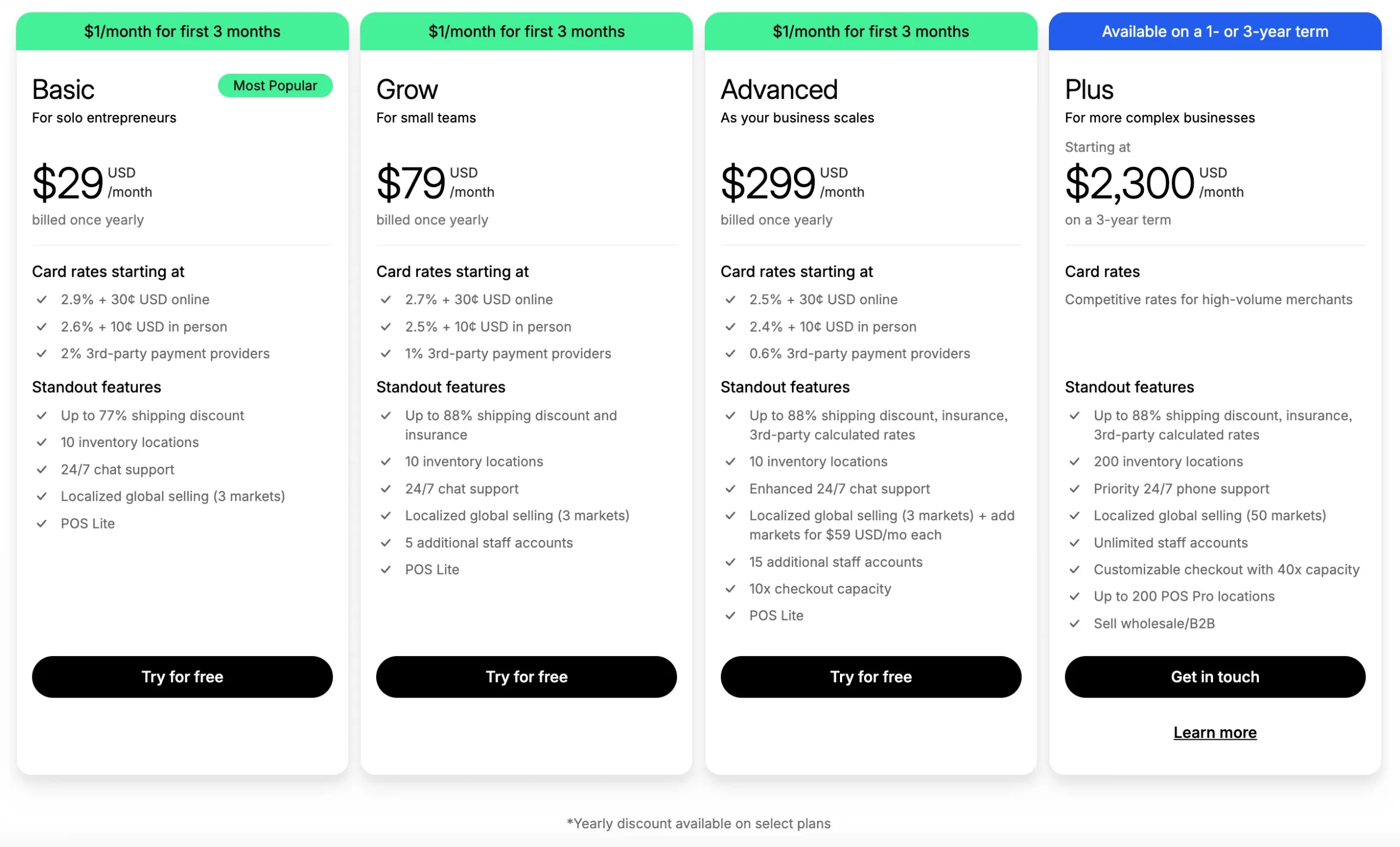
The good news is that every Shopify plan includes unlimited product listings, secure hosting, abandoned cart recovery, and access to the platform’s huge app ecosystem. This makes even the entry-level plan far more capable for online selling compared to Jimdo’s highest-tier eCommerce plan.
To be honest, when comparing Jimdo vs Shopify in terms of pricing, Shopify is clearly the more expensive option. However, many users see it as worthwhile because of the scalability and flexibility Shopify provides. For businesses with serious growth ambitions, Shopify’s pricing represents a strong investment rather than a simple expense.
eCommerce Features
The verdict:
Between Jimdo vs Shopify for eCommerce features, Shopify is the clear winner. It delivers a complete and scalable set of tools that can support businesses at every stage, from small startups to established international brands. With advanced inventory systems, a wide range of payment gateways, and strong shipping solutions, Shopify is built to handle both simple and complex online stores with ease.
When comparing Jimdo vs Shopify in terms of eCommerce features, the gap between the two platforms becomes very clear.
Jimdo includes the essential tools you need to start selling online, such as the ability to list products, set prices, track stock, and accept payments through major gateways like PayPal and Stripe. These features are straightforward, making Jimdo easy to use for beginners or very small businesses. For someone starting with just a few products and a local customer base, Jimdo’s setup certainly feels simple and manageable.

However, we must say that this platform is not built to handle advanced needs. As your store grows, you may find yourself limited by its lack of detailed reporting, smaller range of integrations, and fewer customization options for checkout and product management.
Shopify, on the other hand, is designed from the ground up to support online selling at every level. It offers unlimited product listings, advanced inventory management, and tools that can handle thousands of SKUs with ease. Payment processing is far more flexible, with support for over 100 gateways worldwide, including its own Shopify Payments for lower fees and smoother integration.
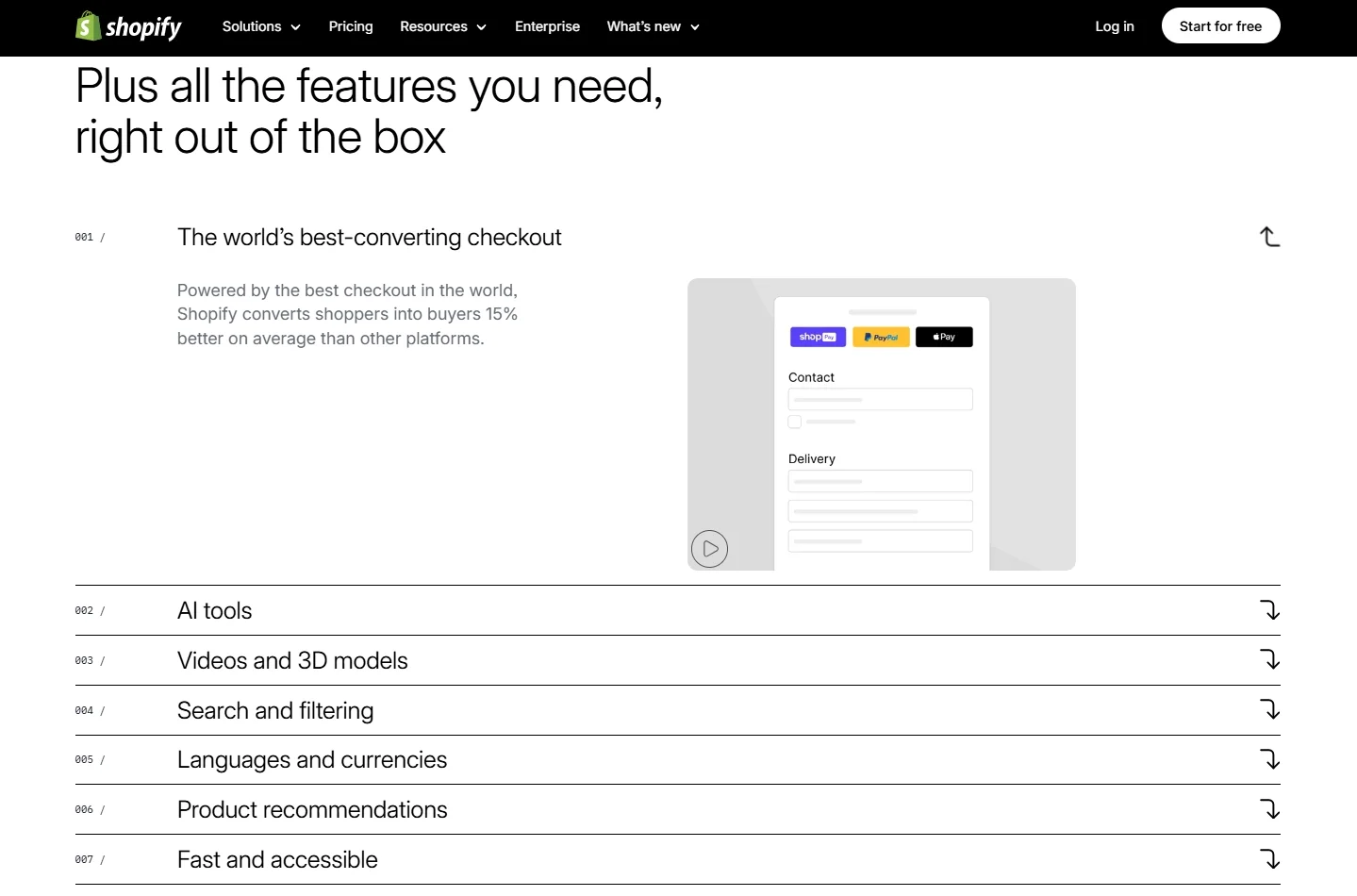
Beyond payments, Shopify provides built-in features for advanced shipping, real-time carrier rates, and connections to fulfillment services, making it suitable for businesses selling across multiple regions or countries. In addition, the app ecosystem extends Shopify’s capabilities far beyond the basics. Whether you want dropshipping, subscription sales, or advanced marketing automation, there’s usually an app ready to integrate.
Overall, the difference between Jimdo vs Shopify comes down to scale and ambition. Jimdo works best for small projects or side businesses that don’t require complex systems. Shopify, meanwhile, is the stronger option for businesses that plan to grow, expand internationally, or need powerful tools to manage a larger catalog.
Ease of Use
The verdict:
Jimdo takes the lead in the battle of Jimdo vs Shopify in ease of use because it offers the simplest and fastest setup experience. Its AI-powered builder removes the complexity of designing a store, making it ideal for beginners who want to launch quickly without a steep learning curve.
When deciding between Jimdo vs Shopify, ease of use is often a key factor, especially for beginners who want to launch their store quickly without technical challenges. Both platforms are designed with non-technical users in mind, but they approach usability in different ways.
Jimdo places a strong emphasis on simplicity. With its AI-powered builder, you can create a basic website or online store in just a few minutes by answering a few questions about your business. The interface is clean and straightforward, so you don’t need any coding knowledge to get started. This makes Jimdo an attractive choice for individuals, freelancers, or small businesses that want a quick and easy setup.
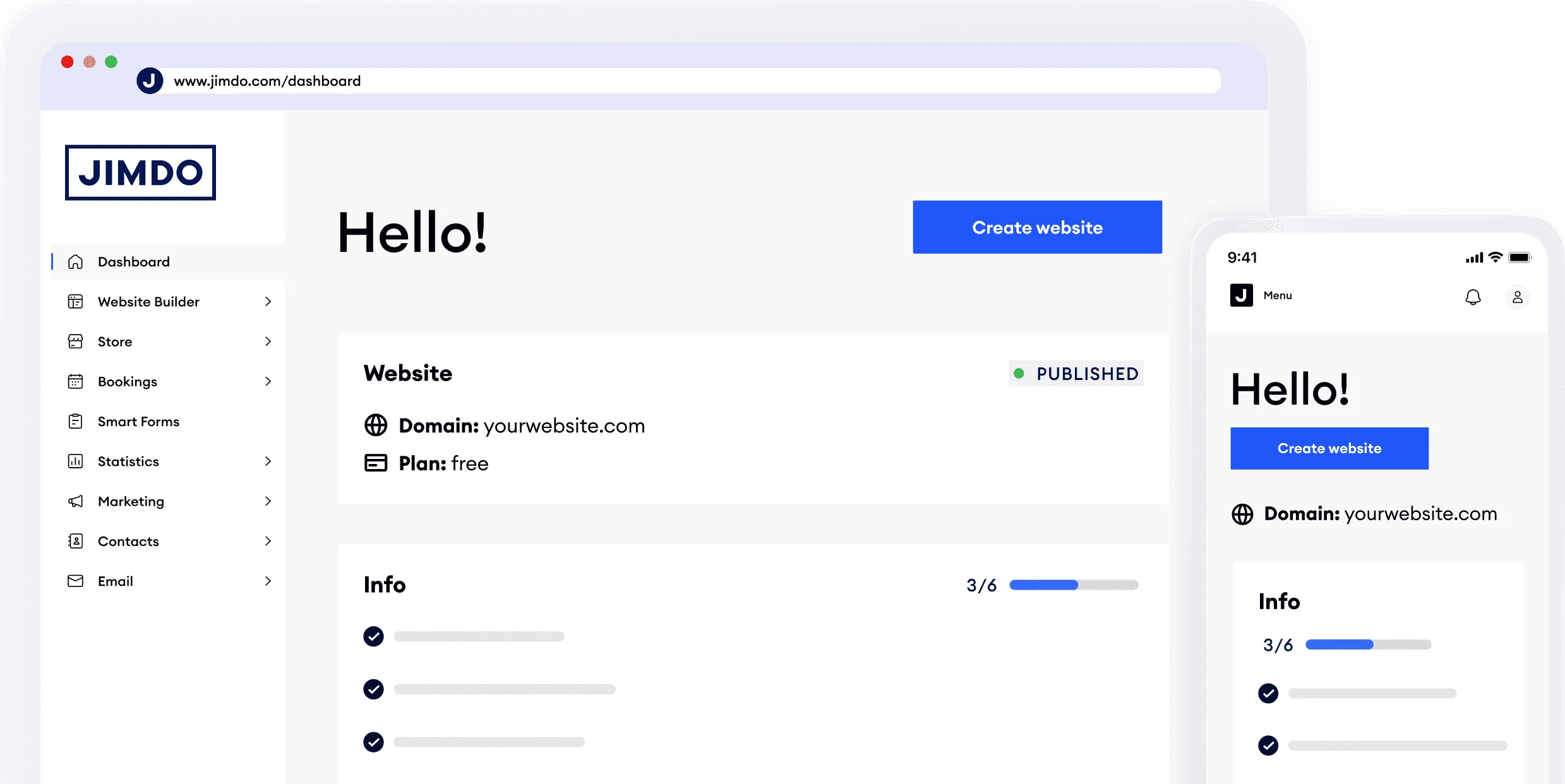
However, the same simplicity that makes it beginner-friendly also means there is less flexibility. As your needs grow, you may feel limited by the lack of advanced customization and fewer options for managing complex tasks.
Similarly, Shopify also focuses on usability but offers a more balanced mix of simplicity and depth. The setup process is smooth, with guided steps that help you add products, configure payments, and launch your store. Its dashboard is intuitive, making it easy to navigate even for first-time users.

At the same time, Shopify provides advanced tools and customization options in the background, which may require a bit of learning for those who want to take full advantage of the platform. While there’s a slightly steeper learning curve compared to Jimdo, most users find that the extra effort pays off as their business grows.
Design and Customization
The verdict:
Between Jimdo vs Shopify, Shopify is the winner for design and customization. It provides a much broader selection of themes, deeper customization options, and advanced control for users who want their store to stand out.
When comparing Jimdo vs Shopify, design and customization play a big role in how professional and unique your online store can look. Both platforms allow you to create a branded website, but the level of flexibility and control they provide is quite different.
Jimdo keeps things simple with a collection of pre-designed templates. These templates are clean, mobile-responsive, and easy to set up with the help of the AI-powered builder. You can adjust colors, fonts, and basic layouts, but customization is limited. For beginners, this simplicity is a strength because it prevents design overwhelm and helps them launch quickly.

However, for businesses that want a highly personalized design or more advanced creative control, Jimdo can feel restrictive since it does not provide deep access to code or complex design options.
On the other hand, Shopify offers far more flexibility. With a large theme marketplace, you can choose from both free and premium designs tailored to different industries. Each theme is mobile-friendly and comes with customization options directly in the Shopify editor. For users with coding knowledge, Shopify also allows full access to HTML, CSS, and Liquid, giving complete creative freedom.

Combined with third-party design apps, Shopify can support anything from small changes to fully customized storefronts. The trade-off is that this flexibility comes with a learning curve and, in some cases, extra costs for premium themes or developer assistance.
SEO and Marketing Tools
The verdict:
In terms of SEO and marketing tools between Jimdo vs Shopify, Shopify clearly takes the lead. It not only covers the basics but also gives businesses the ability to scale their marketing through apps, integrations, and advanced SEO support.
When comparing Jimdo vs Shopify, SEO and marketing tools are key factors that determine how well your store can attract and convert customers. Both platforms include features to help you promote your business, but they differ greatly in terms of depth and flexibility.
Jimdo offers the basics for SEO and marketing. You can edit page titles, meta descriptions, and URLs, which helps your site get indexed by search engines. Jimdo also generates an automatic sitemap and provides SSL certificates for secure browsing.
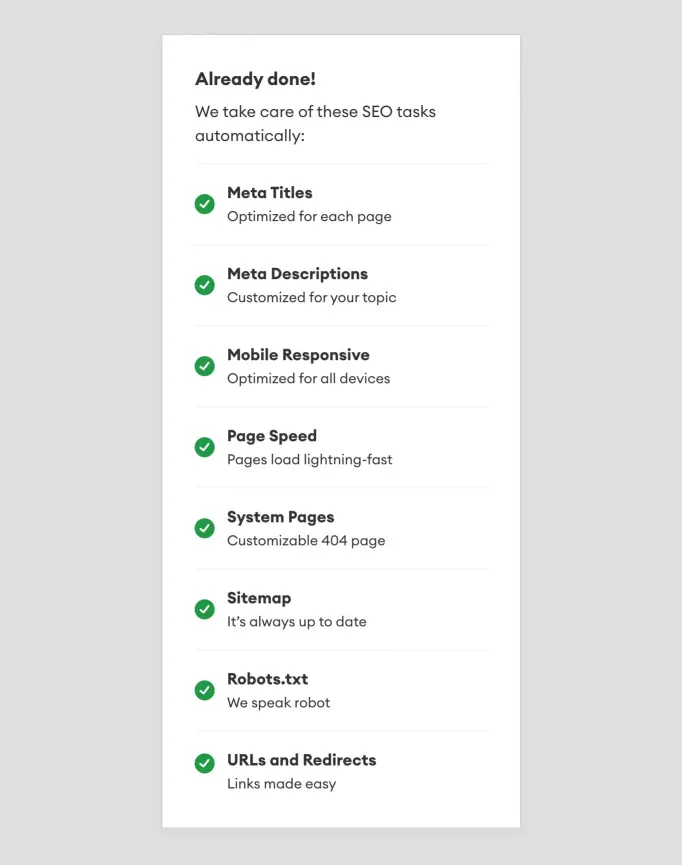
On the marketing side, Jimdo has built-in tools for connecting social media accounts and creating simple promotional features like discount codes. These tools are enough for small businesses that want to handle the essentials, but they may not be sufficient for businesses aiming to compete in more competitive markets.
In contrast, Shopify takes SEO and marketing to a much higher level. In addition to standard SEO features like custom meta tags and redirects, Shopify supports advanced tools such as automatic sitemaps, schema markup, and integration with Google Analytics and Facebook Pixel.
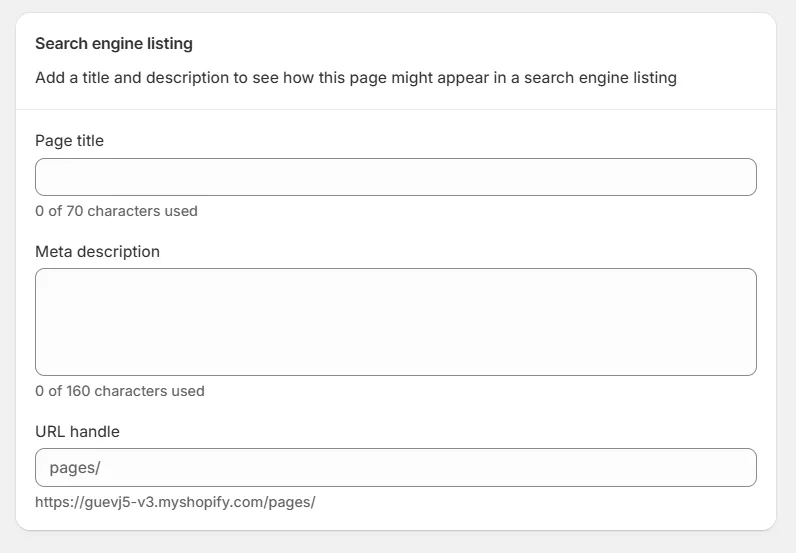
On the marketing front, Shopify allows you to run email campaigns, offer discounts, create gift cards, and connect with a wide range of apps for automation, retargeting, and advanced analytics. This makes Shopify especially powerful for businesses that want to invest in long-term digital marketing strategies.
Apps and Integrations
The verdict:
When it comes to apps and integrations between Jimdo vs Shopify, Shopify í the clear winner. Its extensive app store and open API give businesses the flexibility to scale, customize, and automate their operations.
A strong app and integration ecosystem can make a big difference when choosing between Jimdo vs Shopify, as it allows you to extend your store’s functionality and connect with third-party services. Both platforms support integrations, but their ecosystems are not equal in size or scope.
Jimdo offers only a limited selection of integrations. You can connect basic tools such as social media accounts, Google Analytics, and a few payment providers like PayPal or Stripe. While this covers the essentials, Jimdo does not provide a dedicated app marketplace or a wide range of third-party services. This means your options for expanding your store with advanced features, such as dropshipping, CRM tools, or marketing automation, are quite limited.

For a small store with basic needs, Jimdo’s integrations may be enough, but they are not built to support large-scale growth.
Shopify, in contrast, provides one of the largest app ecosystems in the eCommerce industry. The Shopify App Store offers thousands of apps covering everything from dropshipping and print-on-demand to SEO optimization, marketing automation, accounting, and shipping solutions. Many of these apps are plug-and-play, making it easy for beginners to extend their store without coding knowledge.
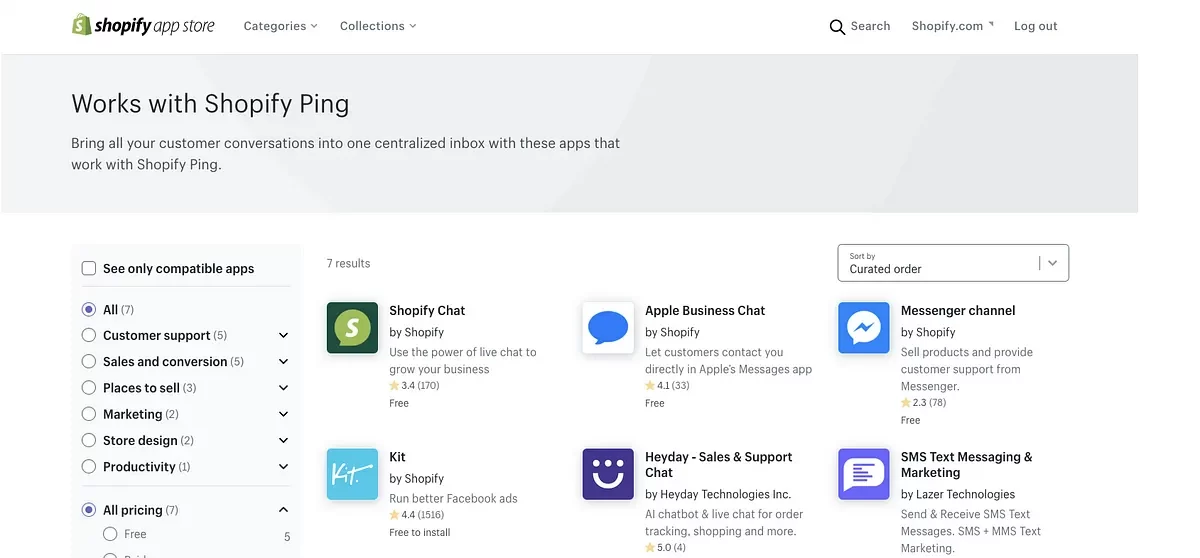
Additionally, for advanced users, Shopify also allows API access and developer customization, enabling deeper integrations with external systems like ERPs or custom business software.
Security Compliance
The verdict:
Between Jimdo vs Shopify in terms of security compliance, both platforms are tie. Jimdo covers the fundamentals that small stores need, while Shopify offers enterprise-level standards for larger operations. In both cases, you can rely on the platform to keep your online store and customer data safe.
When looking at Jimdo vs Shopify, both platforms take security seriously and provide the essential protections needed to run an online store. Each platform ensures customer data is kept safe, transactions are encrypted, and legal requirements are respected.
Jimdo includes SSL certificates on all plans, so customer information is protected during checkout. It also follows GDPR regulations, which is especially important for businesses in Europe or serving European customers. These measures give small business owners peace of mind that their websites meet the basic standards of online security.
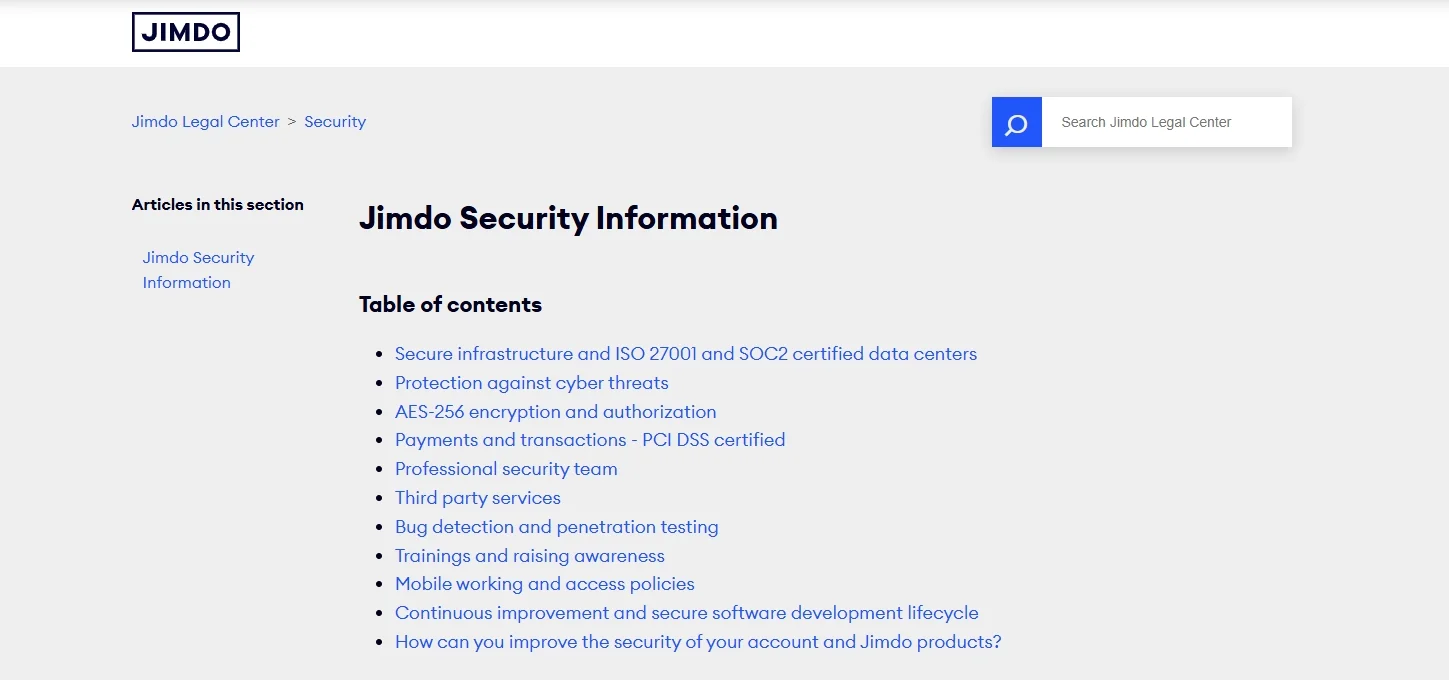
Shopify also includes SSL certificates across all stores and goes further by maintaining PCI DSS Level 1 compliance, which is an international standard for secure payment processing. In addition, Shopify provides fraud analysis tools and a secure hosting environment with frequent updates, ensuring the platform remains trustworthy for businesses handling larger transaction volumes.
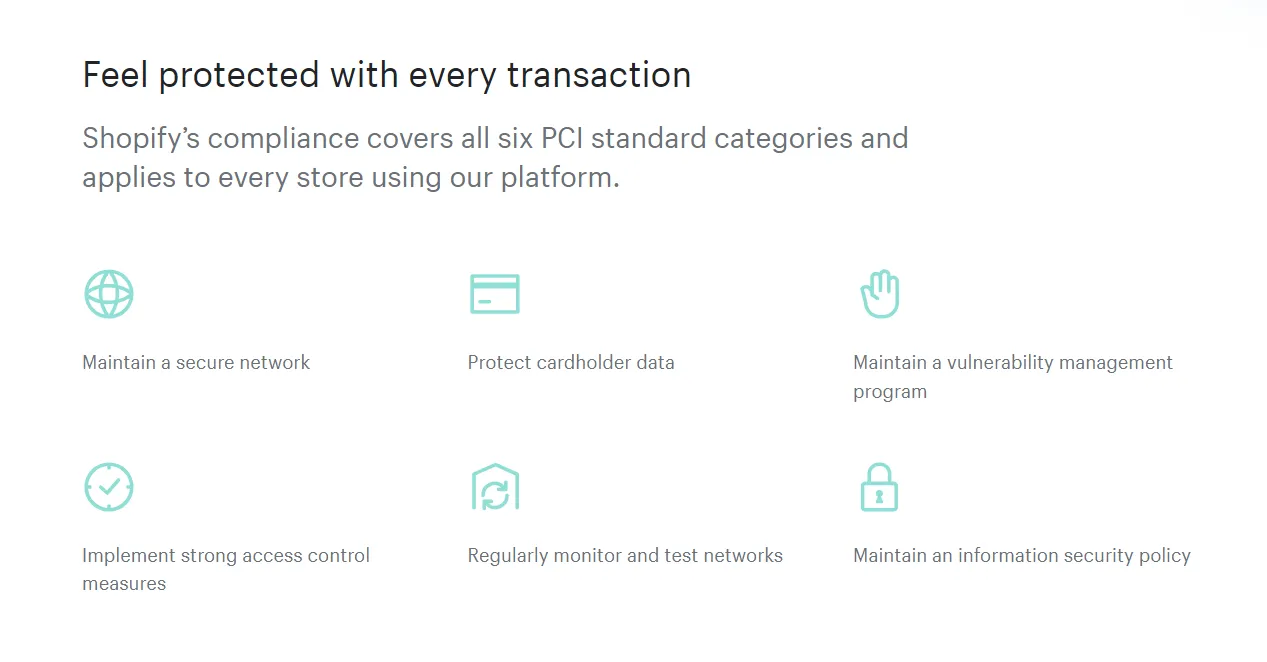
Support
The verdict:
When it comes to Jimdo vs Shopify for support, Shopify is the winner. It provides round-the-clock help, more contact channels, and a larger library of step-by-step resources. On top of that, an active community forum and a large partner network provide extra layers of guidance and troubleshooting.
In the Jimdo vs Shopify comparison, customer support plays a key role in ensuring a smooth experience, especially when technical issues arise or when users need guidance to get started. While both platforms offer support resources, they differ significantly in availability, speed, and depth of help.
Jimdo provides email support across all plans, with priority responses available for users on higher-tier subscriptions. Its help center includes clear, beginner-friendly articles that walk users through common tasks and settings. However, Jimdo does not offer 24/7 live chat or phone support, which can be limiting for store owners who need immediate assistance, especially outside business hours or during urgent issues.

On the other hand, Shopify is known for its robust and always-available support system. This platform maintains a detailed help center, interactive tutorials, and a free learning platform, Shopify Academy, designed to help users grow their knowledge over time. In addition, the Shopify Community Forum and network of certified experts provide extra support options that are valuable for growing businesses.
How We Test Jimdo vs Shopify
To give you a fair and reliable comparison between Jimdo vs Shopify, we followed a hands-on testing process that focused on real-world use. Our goal was to evaluate both platforms from the perspective of someone launching and managing an online store, whether you're just starting out or planning to scale.
Here's how we tested Jimdo vs Shopify:
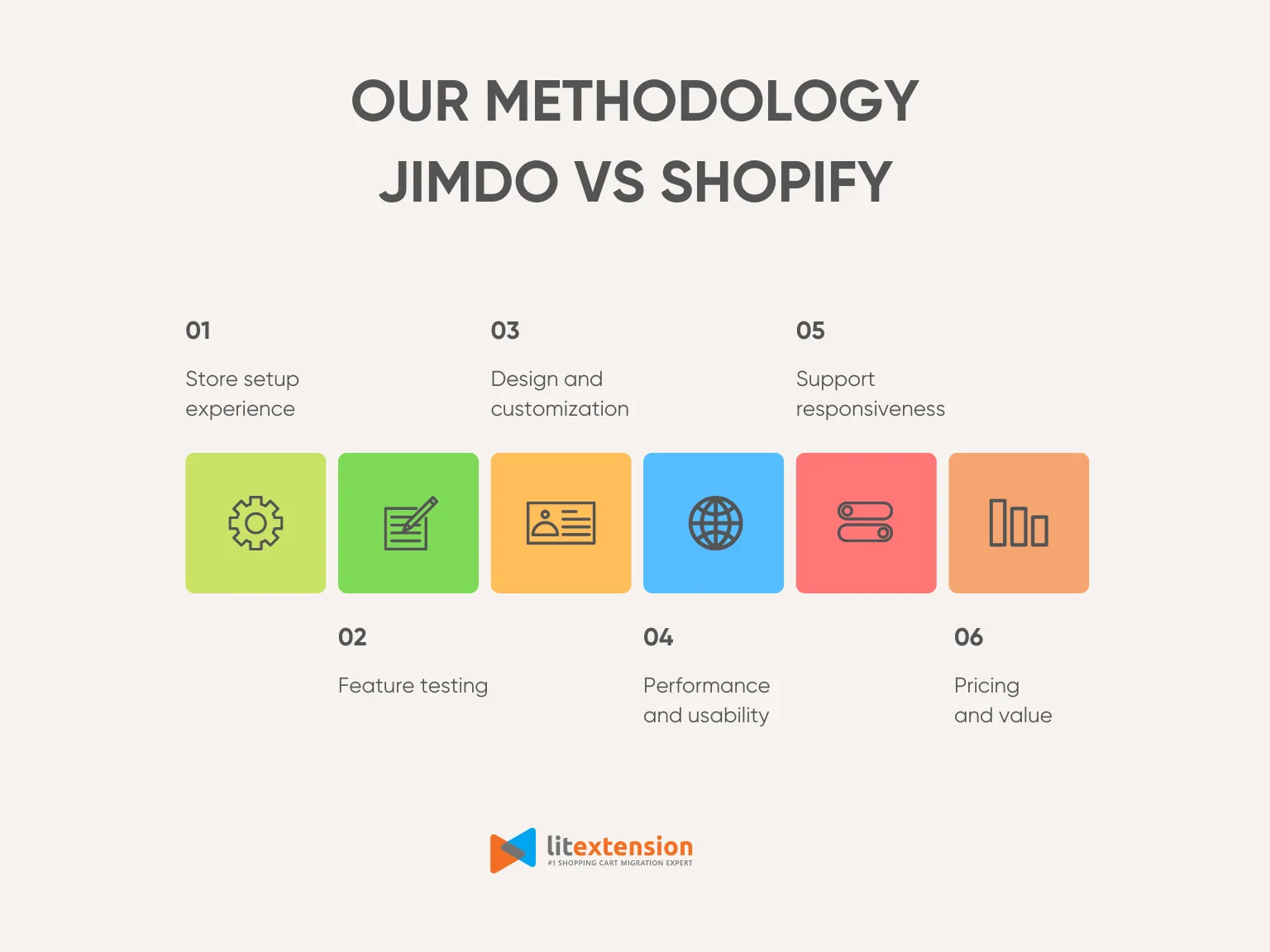
1. Store setup experience
We created test stores on both platforms and measured how long it took to build a working site from scratch. This included signing up, selecting templates, adding products, setting up payment methods, and publishing the store.
2. Feature testing
We explored key eCommerce features such as product management, checkout settings, payment gateway options, and shipping tools. We tested how easily these features could be configured, how flexible they were, and how they supported day-to-day operations for small and growing businesses.
3. Design and customization
We reviewed each platform’s theme options, design editors, and customization settings. We checked whether users could personalize the look and feel of their stores without coding, and how much flexibility was offered to more advanced users.
4. Performance and usability
We assessed how responsive and smooth the user interface was. We also paid attention to loading speed, dashboard navigation, and whether the platform supported users as they scaled, especially in terms of app performance and backend management.
5. Support responsiveness
We contacted each platform’s support team using available channels (email, chat, phone if offered) to evaluate their response time, accuracy, and helpfulness. We also reviewed documentation and self-service resources.
6. Pricing transparency and value
We reviewed each platform’s pricing structure, checking for hidden costs such as transaction fees, paid add-ons, or limits on features. We then compared the overall value each platform offers at different pricing tiers.
By testing Jimdo vs Shopify in these core areas, we aimed to give you a clear, hands-on comparison that goes beyond marketing claims. Every section in this article reflects insights gathered directly from our testing process, so you can make a confident and informed choice based on your store’s needs.
Jimdo vs Shopify – FAQs
How much does Jimdo take?
Jimdo does not charge transaction fees of its own, but you may still pay fees depending on the payment provider you choose, like PayPal or Stripe. These providers typically charge around 2.9% + a small fixed fee per transaction.
Is Jimdo or Shopify better for eCommerce?
Shopify is better for eCommerce, especially if you're serious about growing your business. It offers more powerful tools for inventory management, shipping, marketing, and scaling operations.
Meanwhile, Jimdo is suitable for beginners or very small stores, but it lacks the depth needed for advanced eCommerce needs. If you're just starting and want something simple, Jimdo works, but Shopify is the better long-term solution.
Is Jimdo cheaper than Shopify?
Yes, Jimdo is cheaper than Shopify. It even offers a free plan for basic websites and lower-cost eCommerce plans for small businesses. Shopify’s plans start at a higher price point and often require additional spending on apps or premium themes. However, Shopify provides more advanced tools and better scalability, which can justify the cost for growing businesses.
Can I switch from Jimdo to Shopify?
Yes, you can switch from Jimdo to Shopify. However, the process is not automatic, you'll need to manually move your content, product listings, and other store data.
If you want to have a smooth and secured data transition, please reach out to LitExtension. With over 12 years of experience, we guarantee to migrate all your data between Jimdo and Shopify with no technical skill required.
Final Words
To conclude, choosing between Jimdo vs Shopify depends largely on your business goals, budget, and how much you plan to grow. Both platforms serve different audiences and offer different strengths, so the right choice comes down to what you truly need from your online store.
From our experience, choose Jimdo for simplicity and budget-friendliness, and go with Shopify if you're ready to invest in long-term eCommerce success. For more expert tips and guides, please check out other articles in our LitExtension blogs.

